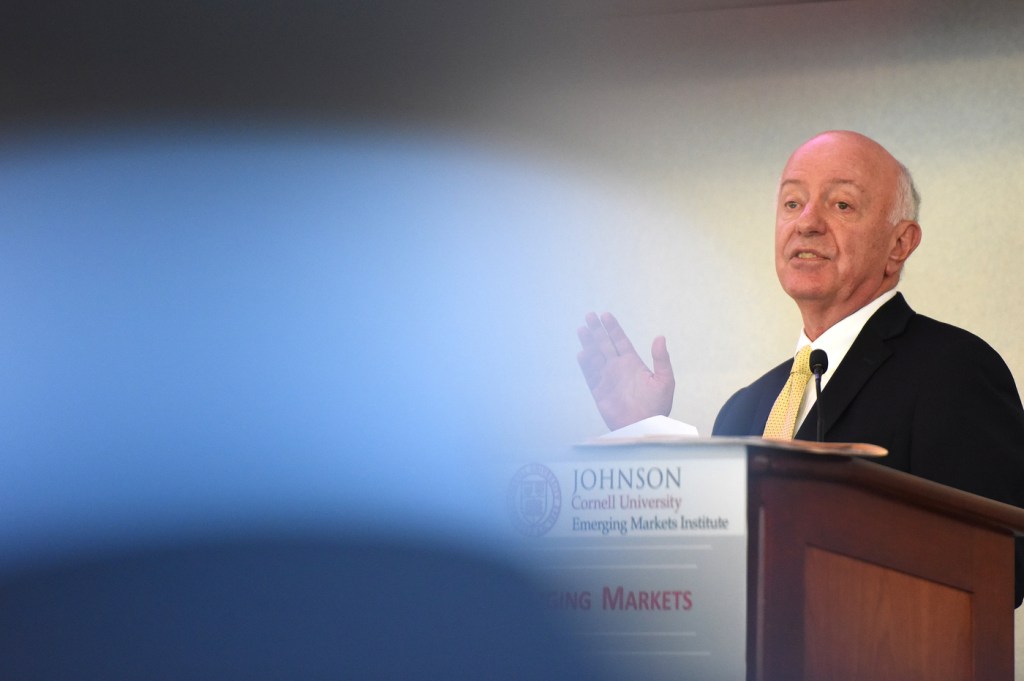Successes and struggles amid the volatility in emerging markets

Northeastern University on Tuesday convened experts from academia and the private, public, and nonprofit sectors to discuss the current economic and political volatility in the world’s emerging markets, and how some countries and companies are thriving in this environment.
Northeastern’s Center for Emerging Markets held the seventh annual symposium, in collaboration with Cornell University. The center’s director, Ravi Ramamurti, Distinguished Professor of International Business and Strategy, opened the discussion with an overview of the current landscape of emerging markets. He said that around 2010, many of these markets had rebounded from the global financial collapse that had been preceded by healthier times during much of the 2000s.
“But we’re back to the kinds of volatility we used to see in the emerging markets in the 1960s, 1970s, and 1980s,” he added.
Keynote speaker Nariman Behravesh, chief economist for Massachusetts-based IHS Global Insight, delved deeper into the so-called “golden decade” of the 2000s, the “perfect storm” that led to the downturn, and worrisome trends and bright spots ahead. He noted that the “golden decade” was highlighted by commodities prices rising dramatically, more companies off-shoring and developing global supply chains, and global interest rates falling. There was a brief upswing after the global financial collapse, he explained, but the most recent downturn for emerging markets overall has featured a sharp slowdown in world trade, a collapse of commodity prices, and rising global interest rates.
We do not expect to go back to the rapid growth rates of the 2000s. I just don’t think that’s in the cards.
— Nariman Behravesh, chief economist for IHS Global Insight, on emerging markets
Right now, he said, there is a “great divergence in the performance of emerging markets.” While Russia, Brazil, and Venezuela are in recession, there are positive signs in the Middle East and Asia-Pacific region, he said, pointing to the fact that India’s economy is growing faster than China’s and new manufacturing hubs such as Vietnam are emerging in southern Asia.
Still, he said, the boom of previous decades isn’t likely to repeat and major structural reforms will be needed if economies are to enjoy rapid growth again. “We do not expect to go back to the rapid growth rates of the 2000s,” Behravesh said. “I just don’t think that’s in the cards.”

Ravi Ramamurti, Distinguished Professor of International Business and Strategy and director of Northeastern’s Center for Emerging Markets, delivers opening remarks. Photo by Matthew Modoono/Northeastern University
Also at the symposium, top representatives from companies operating in Thailand, the Middle East, and Brazil joined via teleconference to share how their companies are thriving amid the overall volatility in emerging markets.
In closing remarks, Ramamurti summarized the key points made throughout the day with regard to thriving in emerging markets. On the point of running lean operations, he noted, “It’s always good to be a low-cost player, but striving to be high quality.” He also underscored speakers’ lessons learned about the benefits of maintaining a long-term view, diversifying geographically, and being nimble enough to move fast and be flexible when operating in emerging markets.
The event’s speakers comprised Alberto Carvalho, president of Proctor & Gamble-Brazil; Aravind Cherukuri, managing director for the Asia Pacific region of Ocean Stray; Ashish Chugh, managing director and portfolio manager at Bay Pond Partners, a hedge fund within Wellington Management Company; David Nardone, DMSB’79, MBA’82, president and CEO of Hemaraj Land and Development Co. Ltd. in Thailand; Karim Smadi, DMSB’93, managing director, Reda Industrial Materials in Dubai; and Stephen Hayes, president and CEO of the Corporate Council on Africa.





